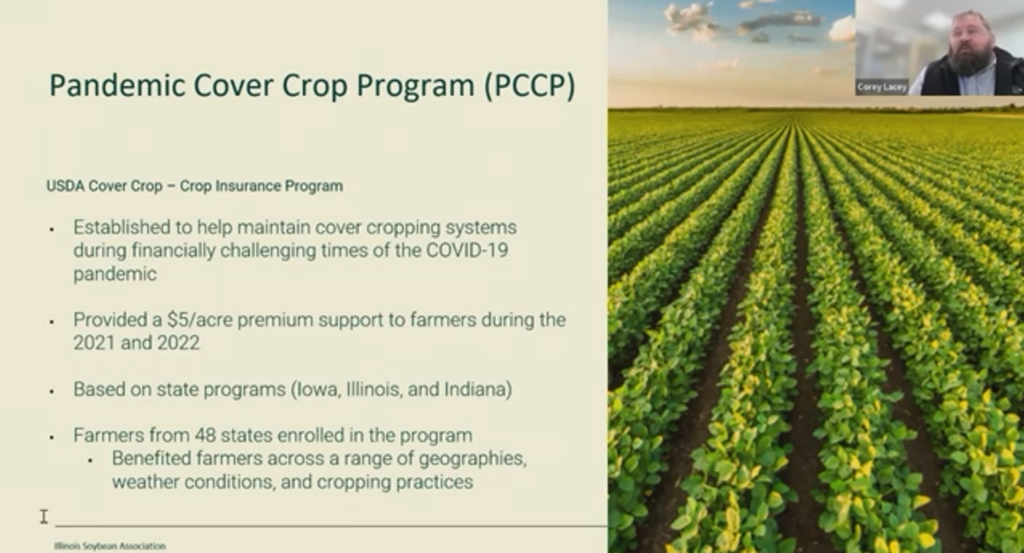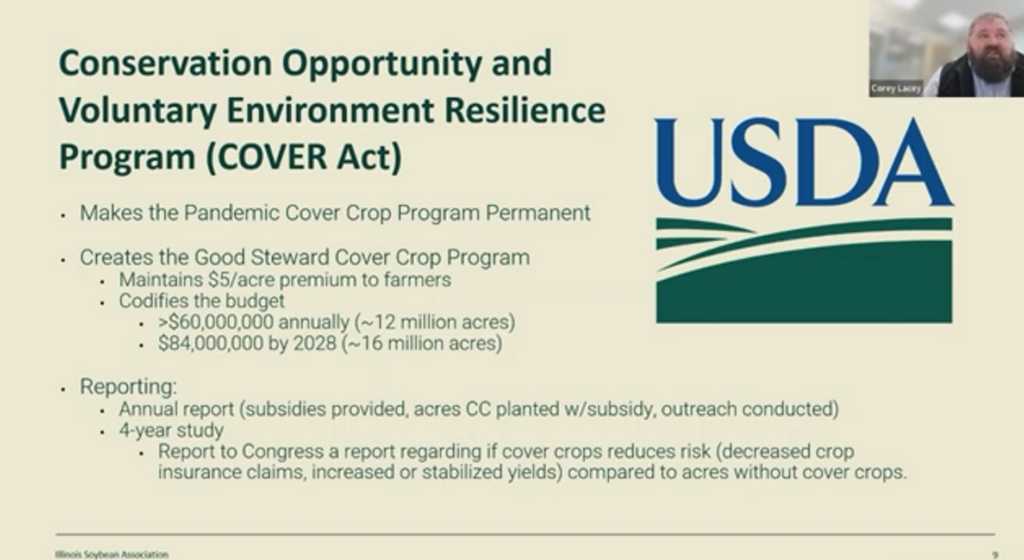On April 12th ICCON was joined by Corey Lacey, Public Policy Manager with the Illinois Soybean Association (ILSA), and Dylan Cook, Midwest Policy Manager with American Farmland Trust (AFT), to discuss policy movement surrounding cover crops and agriculture conservation methods. Corey Lacey focuses his time advocating for Illinois soybean farmers on conservation and environmental policy issues, and Dylan Cook works closely with local partners, stakeholders, and AFT’s Federal Policy team to advocate for policies and programs that protect farmland, support farmer success and well-being, and secure funding for conservation programs in Illinois.
In April’s ICCON call, Lacey and Cook talked about ways the state of Illinois is taking significant steps towards improving soil health and promoting conservation. Most notably, through the Partners for Conservation Reauthorization Act, also known as SB 1701, formerly SB 3471. SB 1701 creates the Healthy Soils Initiative, which coordinates state agencies and Soil and Water Conservation Districts (SWCDs) to develop local soil health assessments. The Illinois Department of Agriculture (IDOA) will use these assessments and district goals to identify opportunities for developing partnerships, shared funding approaches, and effective use of technical resources.
At the time of the call, SB 1701 sought to codify the Fall Covers for Spring Savings (FCSS) program, which promotes cover crop adoption to improve soil health and reduce nutrient loss. In past years, FCSS has been funded by the state budget, requiring approval each year for program funding to be allocated. The version of SB1701 that was discussed during the call would include the Fall Covers for Spring Savings program in the State Finance Act, ensuring continued funding and providing more stability for the program. The bill passed in the Senate with a unanimous vote of 57-0, and is currently being reviewed by the House. However, the version of SB1701 advancing through the House does not include FCSS.
AFT and ILSA are working with the IDNR and IDOA on SB 1701, with conversations focused on understanding budgets and needs for conservation programs. While the bill does not codify the budget for SWCDs, there is strong interest in continuing funding for the NLRS water quality working group that is organized by the IDNR.

Lacey and Cook also discussed updates on the Pandemic Cover Crop Program (PCCP). This program was established by the USDA to help maintain cover cropping systems during financially challenging times of COVID-19. With enrollment spanning 48 states, the PCCP has demonstrated that cover crops are effective across different agriculture landscapes and benefit farmers throughout the United States. In mid-March, the Biden administration proposed a budget of $950 million over ten years for cover crops at a national scale, indicating a nationwide acknowledgement of cover crops’ value in building soil health.
In combination with PCCP, the Conservation Opportunity and Voluntary Environmental Resilience Program (COVER Act) seeks to make the Pandemic Cover Crop Program permanent and create the Good Steward Cover Crop Program, which offers a $5/acre premium to farmers growing cover crops. The COVER Act requires USDA to conduct an annual report of subsidies provided, acres in cover crops with subsidies, and outreach conducted. The bill would also lead to a four-year study analyzing cover crops’ risk reduction.

Presenters touched on several other federal bills, such as the Increased TSP (Technical Service Provider) Access Act, the Conservation and Innovative Climate Partnership Act, the Agricultural Resilience Act of 2023, and the Agricultural Innovations Act of 2023.
In summary, SB 1701 and the COVER Act promote soil health and conservation practices through coordinated efforts between state agencies, SWCDs, and farmers. The Pandemic Cover Crop Program has proven the benefits of cover crops across the United States, and the increase in national funding for cover crop adoption reflects a growing recognition of the role soil health plays in building productive, resilient farming systems.
This summer, ICCON will host a Cover Crop Cocktails series, highlighting considerations farmers should make when deciding which cover crop mix is best for their field and goals. If you are interested in joining the Illinois Cover Crop On-Farm Network to learn about new research and hear from cover crop specialists across the Midwest, you can register for our monthly calls or join our google group by sending an email to hvanbeck@farmland.org.